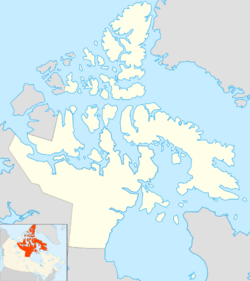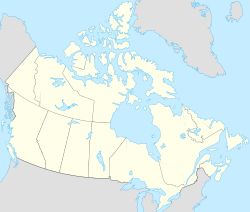Akvitlak Islands facts for kids
| Geography | |
|---|---|
| Location | Coronation Gulf |
| Coordinates | 68°12′N 112°14′W / 68.200°N 112.233°W |
| Administration | |
| Territory | Nunavut |
| Region | Kitikmeot |
| Demographics | |
| Population | Uninhabited |
The Akvitlak Islands are a group of islands found in the far north of Canada. These islands are located in a large body of water called the Coronation Gulf. This gulf is south of a much larger island known as Victoria Island.
The Akvitlak Islands are part of the Kitikmeot Region in Nunavut. Nunavut is one of Canada's three territories. The islands are currently uninhabited, meaning no people live there permanently.
Contents
Where are the Akvitlak Islands?
The Akvitlak Islands are located in the Coronation Gulf. This gulf is an arm of the Arctic Ocean. It lies between the mainland of Canada and Victoria Island. The islands are found at specific coordinates: 68°12′ North and 112°14′ West.
Nearby Island Groups
The Akvitlak Islands are not alone in this part of the Arctic. Several other island groups are nearby. These include:
- Aiyohok Islands
- Duke of York Archipelago
- Home Islands
- Miles Islands
- Nauyan Islands
- Outcast Islands
- Sisters Islands
These islands are all part of the vast and often icy landscape of the Canadian Arctic.
Nunavut is the largest and newest territory of Canada. It was created in 1999 from the eastern part of the Northwest Territories. Nunavut is home to many Inuit people. The name "Nunavut" means "our land" in the Inuktitut language.
The Kitikmeot Region
The Akvitlak Islands are specifically in the Kitikmeot Region. This is one of the three administrative regions within Nunavut. The Kitikmeot Region covers a large area. It includes parts of the mainland and many islands in the Arctic Archipelago. The region's main community is Cambridge Bay.
Why are these islands important?
Even though the Akvitlak Islands are uninhabited, they are part of Canada's Arctic geography. They contribute to the unique environment of the Coronation Gulf. This area is known for its cold climate and diverse wildlife. Animals like polar bears, seals, and various birds live in this region. The islands might serve as important habitats for these animals.
 | Janet Taylor Pickett |
 | Synthia Saint James |
 | Howardena Pindell |
 | Faith Ringgold |



